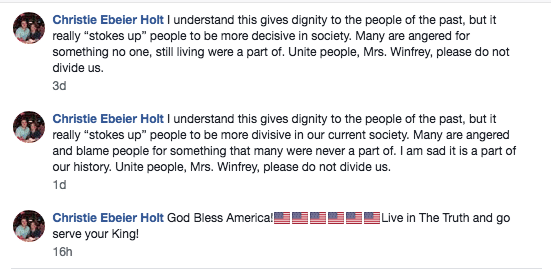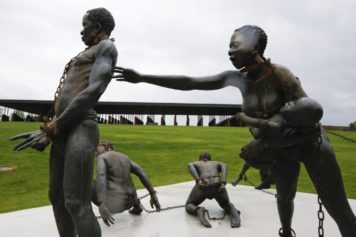Oprah Winfrey got the first look at a new Montgomery, Ala., memorial for the thousands of Black people who were lynched following the Civil War.
The National Memorial for Peace and Justice will open to the public on April 26 and once inside, visitors will be able to get a glimpse how widespread American lynchings were. Names of the victims embellish 805 steel markers for each county that the hangings took place. Taking on various rust shades to reflect the shades of Black people strewn up on trees, the markers also hang from the ceiling to mick what white Americans in their Sunday best once gathered to see.
“We wanted people to have a sense of just the scale of what this violence, what this terrorism was,” says Bryan Stevenson, a lawyer who founded the Equal Justice Initiative who led the building of the privately-funded memorial to Winfrey on the Sunday, April 8 edition of “60 Minutes.”
Stevenson and his team uncovered 4,300 documented lynchings but there are numerous more that we will never know about. Among those on the record include a woman named Eliza Cowen, who was lynched in Lawrence County, S.C. on April 9, 1881.
As Winfrey soon discovered, women were often lynched, too.
“Sometimes because they were accused of something and then sometimes, women would be lynched if they couldn’t find the man they were looking for, they would lynch that man’s wife or daughter or child,” Stevenson explains.
However, while several celebrated the memorial, one woman took issue with it because it apparently led to division and blames white people for what their ancestors did.
“I understand this gives dignity to the people of the past, but it really ‘stokes up’ people to be more decisive in society,” a Facebook user commented. Many are angered for something no one, still living were a part of. Unite people, Mrs. Winfrey, please do not divide us.”
In response, many people chided her.
“I have to disagree with you. My family fled Mississippi in the late ’60s. My grandfather was a sharecropper,” someone else said. “His oldest daughter left Mississippi years earlier because her husband was lynched. She has grandchildren in their 20s today. My family is just 1 generation beyond these atrocities.”
“I’m sorry my family, my [community’s] history of enslavement and lynching makes you uncomfortable, however, you nor those like you will silence our story!” another replied. “You see things through the lens of your own privilege and obviously which does not allow for empathy. Painful or uncomfortable as it may be, our family members deserve for their story to be told.”
“This is American History,” someone else simply offered.
The response led the user to edit her post several times before ending up with, “God Bless America!🇺🇸🇺🇸🇺🇸🇺🇸🇺🇸🇺🇸Live in The Truth and go serve your King!”


